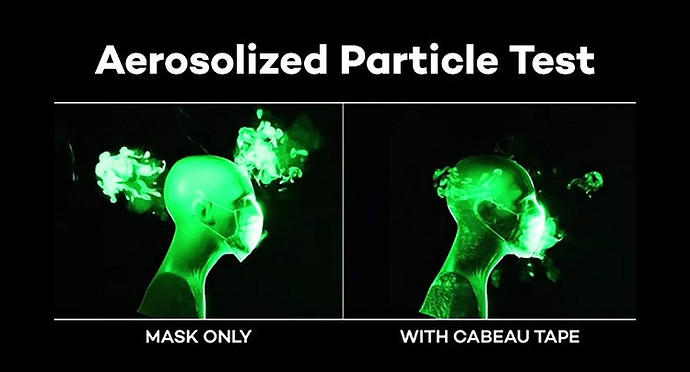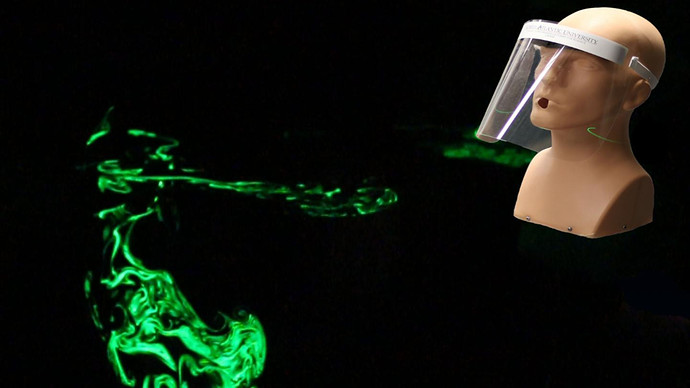Would that be a slippery slope argument. ![]()
It is difficult to generalize. Certainly some garden variety selfish people feel guilt, but others have rationalized it away. It seems to me that what most of them want is preferential treatment, which is what passes for morality for them.
Notice the Doctor at the end states the fact the a Virus is so small it goes right through it.
@Patrick_S, please note. Masks do not filter out virus. Masks filter out droplets of water that carry virus and other germs…
You need to think for yourself.
Actually, they do, not that this is the most authoritative source:
I don’t discount because of the source, though none of the links on the article seem to go to anyone who has done actual testing.
I will return the advice. Drops vs aerosols. Viruses do not only come in large drops, but in aerosolized particles, especially when coughing or sneezing, but also when just talking, singing or breathing. Not only are masks incapable of stopping aerosols, they can remain in the air much longer than droplets.
And, for a mask to be effective, it must be worn correctly and cleaned or changed often. Ever look around at how people are wearing them? Masks must form a seal to the face, or you’re just sucking air around it, making it useless. I have a beard, and it keeps masks from fitting tightly to my face, so it sucks air from all around.
SARS-CoV-2 does not spread well through aerosols, and is mainly spread by droplets. From the CDC:
They are used for 2 reasons only in medicine. To prevent droplets from the doctor or nurses (sweat or drool) infecting an open wound during surgery, and for dealing with sick people in close proximity for long periods, and that is not very effective, even among nurses who are trained on how to wear masks properly.
Good question. This article does indeed reflect some of what was originally a concern. However, the good news is that there is new information based on the Covid 19 pandemic experience, which has far outpaced that of the flu, with smaller studies prior.
Most viruses do not float free. They are attached to droplets. Effectiveness is as much as 70%, even in homes with infected individuals.
Once we get to 80% herd immunity, hopefully spread will decrease tremendously. One mathematical model says parts of the US may be as much as 1/3 immune (not enough by any means to be very significant or loosen mask use or other precautions). With 10% of the US population now immunized, hopefully we will get closer to that. I’ve had the Moderna, to protect my patients. I’m looking forward to some relief (I have a face for radio, so the mask doesn’t really bother me that much).
I got this CDC post originally from @Dale and shared it with our church’s elder advisor.
Thanks! It was very helpful.
https://www.cdc.gov/coronavirus/2019-ncov/more/masking-science-sars-cov2.html
Of course, sucking air around it is not a problem with public mask wearing, as the purpose is to avoid spraying others with your spit, and they do a pretty good job for that purpose.
To a limited degree, especially if you cough or sneeze. Aerosolized particles go right through and around masks or shields. And they can stay in the air for a while.
Below: Still frame from a visualization of an emulate cough showing droplets traveling around the face shield. Credit: Siddhartha Verma, Manhar Dhanak, John Frankenfield.
We touch our eyes, nose or mouth dozens of times per day. No mask can help that method of infection.
Thankfully, vaccines will help fill the gap and bring us closer to normalcy.
No one has said that masks are a guarantee against the spread of Covid-19. They are one tool out of several. Just because a mask is not perfect, does not mean it should not be used. It is a far better alternative than lockdown, except in an emergency… Just because not response is perfect does not mean that we should do nothing.
You say that you have a beard, which prevents a mask from working effectively. If God had told you to wear a mask to fight Covid-19, would you tell God that it doesn’t work or would you have shared off your beard so it would work?
[Content removed by moderator]
**Changed answer. **
No, I wouldn’t, because I don’t believe he would say to do it. There is a reason for beards even if I shave mine once every year or two and start over.
Reminds me of this Muslim man from earlier in the pandemic:
Some of his quotes:
It is not a step I have taken lightly, my beard is not just part of my identity but of my religion. I’ve had a beard for well over a decade and I can’t remember the last time I shaved.
“I have consulted many Islamic scholars and teachers, locally and nationally, sought advice from fellow Muslim healthcare professionals and the British Islamic medical Association.
I’ve shaved off my beard to protect my patients, my colleagues and family. One of the greatest acts is to save someone’s life. This simple act may help to do that."
When Jesus judges believers in Rev 2 and 3 according to their WORKS, is that legalism?
When James 2:24 says “a man is justified by WORKS and not by faith alone”, is that legalism?
When Paul warns believers in Gal 5 and 1Cor 6 that their SINS can result in them not inheriting the kingdom of God, is that legalism?
When Rev 14 describes the “saints” as “those who KEEP THE COMMANDMENTS of God and the faith of Jesus”, is that legalism?
When Christ condemns the “goats” to eternal punishment for NOT PERFORMING GOOD WORKS in Matt 25, is that legalism?
When John 3:36 says DISOBEDIENCE leads to eternal death, is that legalism?
When 1John 3:24 says, “All who KEEP HIS COMMANDMENTS abide in him, and he in them”, is that legalism?
If sin is so irrelevant, why does Jesus tell us to cut off our hand and pluck out our eye if they cause us to sin (Matt 5)?
If sin is so irrelevant, why does Paul warn believers in Gal 5 and 1Cor 6 that their sins can lead them to hell?
If sin is so irrelevant, why does 1John 2:4 say, “He who says ‘I know him’, but disobeys his commandments (ie, sins) is a liar and the truth is not in him”?
If sin is so irrelevant, why does 1Peter 1:15-17 warn believers to “be holy yourselves in all your conduct” because God will judge every believer “according to his deeds”?
I didn’t know that.
If everyone who has ever lived will be saved and admitted to Heaven, why does Jesus say certain “evildoers” will not “enter the kingdom of Heaven” (Matt 7:21-23)?
And why does Jesus say “Enter through the narrow gate. For wide is the gate and broad is the road that leads to destruction, and many enter through it” (Matt 7:13)?
What is “the faithfulness of Christ”?
Deeds are the proof of the pudding. You cannot have a right heart (the real bottom line) and still live willfully like you do not. Deeds must accompany a changed heart, or else the latter is highly suspect, from our point of view. And anyone who thinks they have a right heart and yet continues to engage in evil deeds or absence of good deeds is fooling themselves. But ‘righteous living’ and good deeds are also not proof of a right heart in themselves.
You didn’t answer my question: “At what point did Jesus give you your ticket to Heaven? The moment you came to Christ? One week later? A year later? When?”
You claim to know how you were “saved” and that you are certain of gaining eternal life, but you can’t tell me when Jesus gave you your ticket to Heaven. I find that rather odd.
Include me. ![]() My adoption is irrevocable, but I am clueless when it was ‘official’. Somewhere in my youth*, but I became more aware of it and sure of it during my senior year in high school and following.
My adoption is irrevocable, but I am clueless when it was ‘official’. Somewhere in my youth*, but I became more aware of it and sure of it during my senior year in high school and following.
(My parents were of a kind of revivalist theology, baptistic …but my mom said ‘deep water Presbyterian’ one time ![]() , and I raised my hand at more than one alter call when I was little.
, and I raised my hand at more than one alter call when I was little. ![]() )
)
*…or ‘before’ in eternity past:

